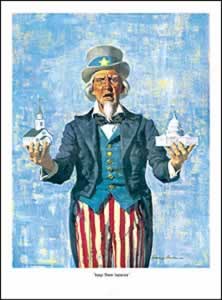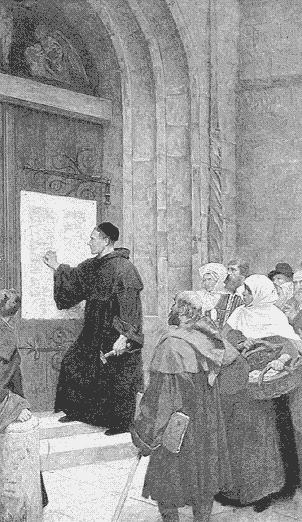by Greg Szymanski, JD
July 27, 2010
(Excerpts) No one in their right mind can deny the necessity for a separation of Church and State.Then why is it many proclaim these United States of America to be either a Christian, Protestant or Catholic nation?
The reason is most Christians, Protestants and Catholics are not of sound mind at least when it comes to understanding their country and the Constitution it was founded on.We are free to worship as we choose, but we are not a nation to let those who worship dictate their own personal agendas.
I fear men of strong heart and sound minds no longer exist, leaving our nation in the hands of those dictated by the folly of emotion and self-interest.
It should be remembered that this country never was, it is not now and never will be a Christian, Protestant or Catholic nation. Of course, zealous and fanatical members of all three groups will try and persuade you otherwise, but the truth is America is something much different, something much more secular than “God-faring” men would like to admit.
Morality and the founding of America are light years apart as the historian, Robert Middlekauff, observed, “the idea that the Constitution expressed a moral view seems absurd. There were no genuine evangelicals in the Convention, and there were no heated declarations of Christian piety.”
So as Christian fundamentalists today continue to try and convince America to return to the Christianity of early America, according to the historian, Robert T. Handy, “No more than 10 percent– probably less– of Americans in 1800s were even members of congregations.”
It is this fictitious cloak of religious nonsense labeling our country and its founders falsely without a clear basis in fact that must be uncovered if America is to survive.
The idea that this country was founded on biblical principles is absurd; It must be remembered that we cannot go back to something that never was. Our country was founded in order that each one of us worship as we choose free from oppression; It was not intended that your particular religious or spiritual view become the oppressor of the freedoms inherent in our Constitution, a document that respects the Jew as much as the Atheist, the Christian as much as the Muslim.
If this spiritual oppression or self-righteousness among our leaders and our people occurs, we become as dangerous as the enemy that we now face, an enemy deeply entrenched in the bowels and confines of the U.S. government and the strong religious groups that support it.
Thomas Jefferson interpreted the 1st Amendment in his famous letter to the Danbury Baptist Association in January 1, 1802:
“I contemplate with sovereign reverence that act of the whole American people which declared that their legislature should ‘make no law respecting an establishment of religion, or prohibiting the free exercise thereof,’ thus building a wall of separation between church and State.”
Some Religious activists try to extricate the concept of separation between church and State by claiming that those words do not occur in the Constitution. Indeed they do not, but neither does it exactly say “freedom of religion,” yet the First Amendment implies both.
Today, if ever our government needed proof that the separation of church and State works to ensure the freedom of religion, one only need to look at the plethora of Churches, temples, and shrines that exist in the cities and towns throughout the United States. Only a secular government, divorced from religion could possibly allow such tolerant diversity.
Treaty of TripoliUnlike governments of the past, the American Fathers set up a government divorced from religion. The establishment of a secular government did not require a reflection to themselves about its origin; they knew this as an unspoken given. However, as the U.S. delved into international affairs, few foreign nations knew about the intentions of America. For this reason, an insight from at a little known but legal document written in the late 1700s explicitly reveals the secular nature of the United States to a foreign nation. Officially called the “Treaty of peace and friendship between the United States of America and the Bey and Subjects of Tripoli, of Barbary,” most refer to it as simply the Treaty of Tripoli. In Article 11, it states:
Joel Barlow, U.S. Consul General of Algiers Joel Barlow, U.S. Consul General of Algiers …Copyright National Portait Gallery Smithsonian Institution/Art Resource NY
“As the Government of the United States of America is not in any sense founded on the Christian religion; as it has in itself no character of enmity against the laws, religion, or tranquillity, of Musselmen; and as the said States never have entered into any war or act of hostility against any Mehomitan nation, it is declared by the parties that no pretext arising from religious opinions shall ever produce an interruption of the harmony existing between the two countries.”
So here we have a clear admission by the United States that our government did not found itself upon Christianity. Unlike the Declaration of Independence, this treaty represented U.S. law as all treaties do according to the Constitution (see Article VI, Sect. 2).
Although the Christian exclusionary wording in the Treaty of Tripoli only lasted for eight years and no longer has legal status, it clearly represented the feelings of our Founding Fathers at the beginning of the U.S. government.
Christian SourcesVirtually all the evidence that attempts to connect a foundation of Christianity upon the government rests mainly on quotes and opinions from a few of the colonial statesmen who had professed a belief in Christianity. ..But statements of beliefs, by themselves, say nothing about Christianity as the source of the U.S. government.
In the Supreme Court’s 1892 Holy Trinity Church vs. United States, Justice David Brewer wrote that “this is a Christian nation.” Many Christians use this as evidence. However, Brewer wrote this in dicta, as a personal opinion only and does not serve as a legal pronouncement. Later Brewer felt obliged to explain himself: “But in what sense can [the United States] be called a Christian nation? Not in the sense that Christianity is the established religion or the people are compelled in any manner to support it. On the contrary, the Constitution specifically provides that ‘Congress shall make no law respecting an establishment of religion or prohibiting the free exercise thereof.’ Neither is it Christian in the sense that all its citizens are either in fact or in name Christians. On the contrary, all religions have free scope within its borders. Numbers of our people profess other religions, and many reject all.”
Conclusion
The Framers derived an independent government out of Enlightenment thinking against the grievances caused by Great Britain. Our Founders paid little heed to political beliefs about Christianity. The 1st Amendment stands as the bulkhead against an establishment of religion and at the same time insures the free expression of any belief. The Treaty of Tripoli, an instrument of the Constitution, clearly stated our non-Christian foundation. We inherited common law from Great Britain which derived from pre-Christian Saxons rather than from Biblical scripture.
Today we have powerful Christian organizations [as in the video above] who work to spread historical myths about early America and attempt to bring a Christian theocracy to the government. If this ever happens, then indeed, we will have ignored the lessons from history. Fortunately, most liberal Christians today agree with the principles of separation of church and State, just as they did in early America.
“They all attributed the peaceful dominion of religion in their country mainly to the separation of church and state. I do not hesitate to affirm that during my stay in America I did not meet a single individual, of the clergy or the laity, who was not of the same opinion on this point.” -Alexis de Tocqueville, Democracy in America, 1835 Investigative Journal


















0 comments:
Post a Comment